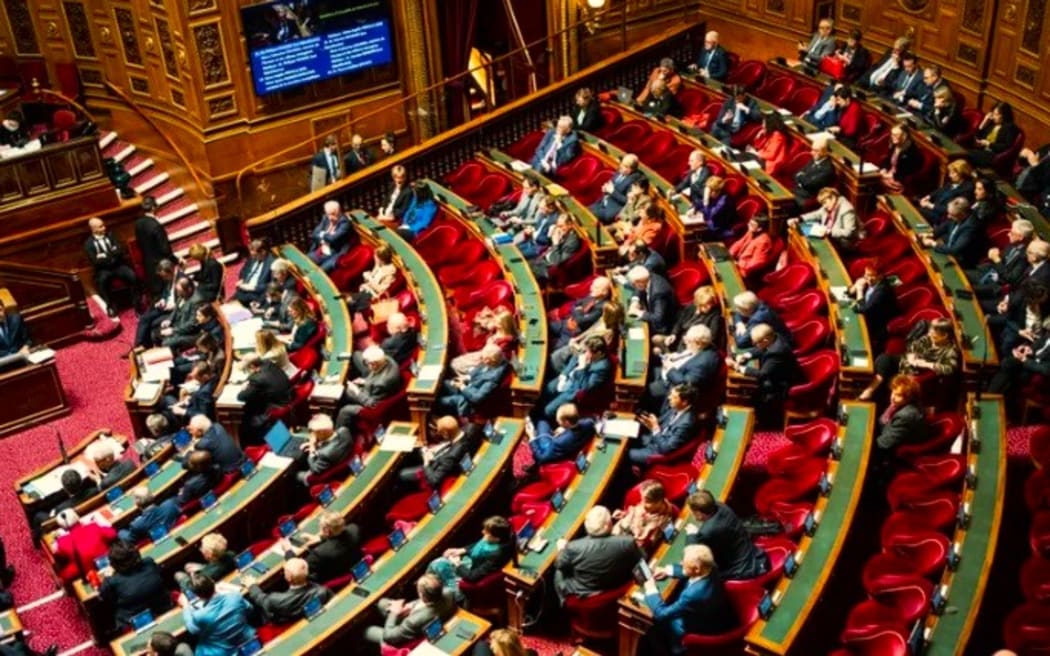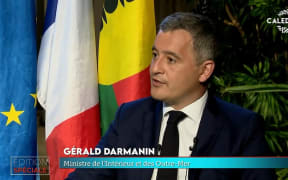
The French Senate in session. Photo: Supplied
The French Senate on Tuesday voted by a large majority (307 in favour and 34 against) the postponement of New Caledonia's crucial provincial elections later this year.
This takes the shape of an "organic law" effectively changing the timeframe for New Caledonia's elections for its three provinces from mid-May to "15 December at the latest".
Another related issue, that would this time require a constitutional approach, is a controversial change in the eligibility conditions of New Caledonia's voters list for local elections.
French Home Affairs and Overseas minister Gérald Darmanin has earlier justified the text saying this allowed about 25,000 French citizens, "Kanaks and non-Kanak" to exercise their right to vote in local elections, which they had been denied under previous rules introduced as part of the 1998 Nouméa Accord.
The Accord was only allowing people who had been residing in New Caledonia before 1998.
The new proposed restrictions would change the 1998 "frozen" list to a simple minimum ten year of consecutive residency in New Caledonia.
This, Darmanin told the Senate once again on Tuesday, was to modify New Caledonia's electoral framework to "allow [New] Caledonians to choose their elected local leaders in minimal democratic conditions".
"The 'frozen' electoral roll was compatible with neither the essential principles of democracy nor the values of the [French] Republic," Darmanin stressed.
"The minimum ten year period seems perfectly reasonable and those who are against this are in fact against democracy," Darmanin told reporters during yet another visit to New Caledonia last week.
Robert Xiowe, the recently elected first pro-independence Kanak Senator, however voiced his opposition, saying this was "an attempt from the French government to erase the Kanak people by drowning it in a demographic flow", a move he said was akin to "an attempt to legitimise a new form of colonisation".
On New Caledonia's future political status, Darmanin also repeated that "if an inclusive agreement is reached between pro-independence and anti-independence political parties, the [French] government will then be in a position of 'referee' and will convene the [French] Congress" - a gathering of both Houses of the French Parliament, the Senate and the National Assembly - for a special meeting on a constitutional amendment, with a majority of three fifths required to modify France's supreme law.

French Interior Minister Gerald Darmanin on 30 August 2023 in Paris, France. Photo: Christian Liewig - Corbis
Darmanin earlier explained that the deadline for inclusive political talks to come to produce a tangible outcome was 1 July. In this case, the government-initiated constitutional amendment process could be suspended and the locally-produced text would then be taken into account as a priority.
"I've always said that if there was a local agreement, even if we were just a few meters away from concluding such an agreement, we would look at the possibility of postponing or even stopping the constitutional process to include the new text", he stressed last week.
"But for now, all I can see is people who do not turn up at meetings and who do not take their responsibilities", he deplored.
Over the past few months, talks between parties in New Caledonia have started but under various formats and they have yet to yield a consensual, bipartisan and inclusive proposal for the French Pacific entity.
The postponing of the date of provincial elections is also seen as a way to allow more time for local political talks to come to fruition.
The Senate's vote is regarded as the first step in a long legislative and constitutional journey which would also involve a constitutional amendment to modify New Caledonia's status vis-à-vis France.
Other steps specifically related to the organic law are a similar vote in France's lower House, the National Assembly, on 18 March.
New Caledonia's FLNKS, an umbrella grouping several pro-independence parties (who have in recent months displayed divisions) is scheduled to hold its Congress on 23 March.
Four days after that, on 27 March, France's Constitutional amendment draft is to be discussed before the French Senate in Paris and in the French National Assembly on 13 May.
Once these two steps are completed, a special meeting of the French Congress (which is a gathering of both Houses of Parliament is required to pass, or not, the text at a majority of three fifths.


